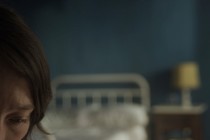Harry Cleven
by Marceau Verhaeghe - Cinergie.be
- Trouble is the history of a man who has become the victim of a plot he does not understand but which is gradually closing up on him. To escape, he needs to understand, alone, what hides under
Five years after Pourquoi se marier le jour de la fin du monde ?, Harry Cleven is back behind the camera. And once more, it is with a strong film, plunging audaciously into the heart of a destructive maelstrom of love and hate. The director from Malmédy depicts fraternal relationships with unusual intensity, and shows how they twist and turn out of proportion. We are made to share the main character's anguish until it reaches an apex, and that is probably what distinguishes most Trouble from Harry Cleven's previous films. Indeed, here, the spectator is meant to empathize with Mathyas and his everyday fight for life against the terrible mechanism of exclusion he already knows but too well but which threatens again to destroy all he has and take away from him the affection of the ones he loves and needs most. Trouble is the history of a man who has become the victim of a plot he does not understand but which is gradually closing up on him. To escape, he needs to understand, on his own, what hides under the terrible plot.
A park. A young man, a pregnant young woman, and a five-year-old child play in the sun. The scene and the protagonists, Mathyas, his Claire wife and their son Pierre, radiate with family bliss. For Mathyas, placed when he was six in an orphanage, with no memory of his early childhood, this complicity, this happiness is some kind of revenge on life. But here comes a letter from the solicitor, summoning him to come and gather what his mother, who he thought had been dead for ages, left him. At the solicitor's, he meets his twin: Thomas, a brother he didn't even know existed. Thus, childhood memories come back under the form of an enormous lie. Mathyas's parents were not dead, but instead, abandonned him while his was anything him said? And why doesn't he remember anything?
After recovering from the initial shock, Mathyas and Thomas try to catch up and start seeing each other a lot. Thomas appears to be a delightful person, and it does not take much time for him to win Claire and little Pierre's affections. For Mathyas, however, there is something that does not fit, although he cannot really say what is wrong.Little by little, Mathyas starts suspecting Thomas of trying to invade his life and discredit him in his wife and his son's eyes, maybe even to get rid of him and take his place. Is this what's happening? Or is Mathyas slowly becoming mad, as his brother gets closer? The only thing that could help him sort things out would be to remember the past and what brought to their separation. But he still does not remember a thing, and no one, especially not his brother, is willing to help him.
This kind of situation, with this kind of paranoid background, is, for a thriller, a traditional pattern. But Harry Cleven is only superficially interested in traditional thriller. What he does is use this genre to reach deeper spheres of the human soul, to study the process of memory, destroy all links with reality, taking us deeper and deeper into Mathyas' 'trouble'. The director and scriptwright maliciously scrambles the cards, plays with the mesmerizing theme of duality, as Cronenberg did before him in Dead Ringers, not to mention Tsukamoto in Gemelli (which, no matter how different it could seem, shows a couple very much like the couple Mathyas/Thomas). Benoit Magimel, under Cleven's brilliant direction, has the beauty of the devil and embodies perfectly the two brothers, which makes the confrontation between them even more puzzling. Next to him, the subtlety of Natacha Régnier's interpretation is even more striking. For it is difficult to understand hos Claire can go from one to the other without the shadow of a doubt, accepting such a radical change as something possible, thus denying the lovely and tender life she had before. Yet, the very improbability of such a situation is the key to what is really at the core of the film, the notion of dispossession. It is about seeing, suddenly, someone else (or a part of oneself), enter into our nice little life and gradually steal our place into the loved ones' hearts ans lives. Of course, it is possible to fight, but each reaction, each clumsy step, can bring us further into the trap, thus revealing our inability to prevent the Other from throwing us out of our own lives. Dispossession has an even stronger impact on Mathyas, for he already went through this during his childhood, though he thought it was now over forever, thanks to the love of his wife and his son. But history repeats itself and Mathyas has been swallowed once again into the mechanics of exclusion. Harry Cleven manages to convey this feeling and this undefined anguish with unusual mastery. He is a storyteller, more interested in symbols than in likelihood, alternating warth and distress, tenderness and horror; he plays with his character's feelings and make him, and the spectator feel what Trouble means.
From an artistic point of view, Harry Cleven sets up a whole machinery to convey all these emotions. Cutting, rhythm, editing, settings, and light, slowly take us, together with Mathyas, directly to hell. But we won't linger on technical issues here, since we will discuss it directly with Harry Cleven in an interview which will be published in our next edition. It is already clear, however, that Trouble masters the cinematic language and techniques. This makes Harry Cleven very likely to get very soon all the acclaim he has deserved, as a great director, since his very first short film Sirène.
Did you enjoy reading this article? Please subscribe to our newsletter to receive more stories like this directly in your inbox.



















